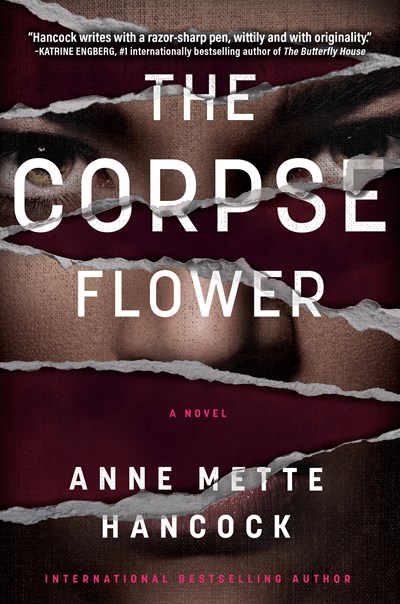Fans of the Pretty Little Liars book and TV series and Shepard’s multiple other novels will come to this work looking for a mean girl to hate, and they’ll find it in Piper, the director of the preschool that serves the right kids in a moneyed California town. Andrea, Lauren, and Ronnie stick out like Target shoppers at Tiffany & Co. when they show up with their kids on the first day. They gravitate towards one another to survive the haughty sniffs from the vegan mac ‘n cheese set. Andrea is transgender and is hiding that she was suspected of pedophilia years ago; Ronnie works as a topless maid, which is the least of her secrets; and new-mom Lauren is struggling through what she has been told is postpartum rage. When Piper is attacked, the police focus on Andrea, Lauren, and Ronnie as culprits, and the women even begin to suspect one another. Shepard offers another insightful foray into the lives of privileged women, once more uncovering secrets, betrayals, and unexpected grace along the way. HBO is sure to come knocking again, but don’t wait–this is a perfect beach read, and ideal for readers who enjoyed Janelle Brown’s Pretty Things.
Psychological
Some books you read for plot. Others for setting. But this dazzling debut is all about voice, specifically that of Ruby Simon, lovable murderer. The book opens with 30-year-old Ruby at the Miami Beach Police Department, being interrogated about the recent death of her husband Jason—the one murder she isn’t responsible for—as well as three earlier deaths she did commit, but got away with. “Four is beyond a pattern. Four is beyond bad luck or coincidence. Four means I’m at the center of it all, these deaths orbiting around me like the planets around the sun.” Ruby takes us back to her first murder at five years old, when she drowned another little kid, her teen years in Miami Beach (one more murder), college at Yale, then back to Miami for graduate school in psychiatry (another one bites the dust), and finally Jason’s accidental demise. It’s tempting to think Ruby is a sociopath, but no, she experiences a full range of emotions, from empathy to regret and from compassion to sympathy. It’s the rare book that has you rooting for a multiple murderer, but that’s just part of screenwriter Rothchild’s magic. The most engaging novel I’ve read yet this year.
At a time when Hollywood stars are bribing the way for their offspring to attend prestigious colleges, the over-the-top antics of teachers, parents, and students at the elite Belmont Academy are nearly credible. While told from multiple points of view, the novel centers around the deeply disturbed Teddy Crutcher, Belmont’s reigning teacher of the year, and Zach, the only reliable narrator, whose straight-A record is in jeopardy thanks to Crutcher. Harkening back to mysteries of the Golden Age, the Belmont community’s weapon of choice is poison—successful, providing it reaches the right recipient. There’s lots to appreciate in this absolutely delicious book, and Zach’s painful conversations with his arrogant, self-obsessed, and Ivy-focused parents are a tour de force. Teen readers suffering through the admissions process will also enjoy this novel. By the author of the much appreciated My Lovely Wife.
Broke NYU student Trevor eats ramen noodles while his dorm neighbor Claudia, famously the daughter of a music producer, is more about the expensive Japanese restaurant down the street. But they’re thrown together when Claudia is assaulted. Claudia’s body tells her that the hours missing from her memory of the drunken night before included violent sex; physical hints aren’t necessary when her abuser posts a video of her rape. Dahl presents Claudia’s ordeal as both horrifyingly mundane—the campus health center has a well-worn rape protocol, and she’s forced to go through the bleak motions—and engagingly suspenseful. The young woman’s family seeks to save her and find the truth, while another rich kid’s family is battling to hide it. Since the details of the rape are unclear to Claudia, and the video is only briefly described, Dahl mainly focuses on the aftermath of the attack, sparing readers a detailed rape scene. What they get instead is a close look at the physical and mental torture of absorbing an attack; the ways in which kindness can be a salve yet a crushing contrast with hurt; and, most of all, a lesson that redemption is owed to every victim.
Since Claudia Vera’s mom died, it’s just Claudia and her four-year-old son, Henry. She struggles to pay for the cheapest daycare in her Illinois town and is overjoyed when the exclusive Hawthorne School gives Henry a full scholarship, asking the awestruck mom only to volunteer at Hawthorne in return. Things soon turn decidedly odd. Claudia never sees any other parents, and the principal is increasingly insistent on Hawthorne’s unorthodox ways and on Claudia spending hours at the school doing unnecessary tasks. Oddness soon turns to a frightening effort to control—as the publisher’s discussion questions note, this book can be read as an allegory on narcissistic abuse—and Claudia finds herself in the most confusing and terrifying situation of her life. Scary, gothic schools are often found in mysteries, but this one differs in only featuring psychological horror (author Perry is a psychologist), no ghostly terrors. It also differs in presenting a Latinx mom and the use of Spanish (which you don’t need to understand to read the book) to both propel the narrative and help the protagonist. Perry excels in getting inside the head of an unsure mom and has written one of the most unusual and best mysteries of 2021. Fans of psychological mysteries and of the movie Get Out are the audience for this.
Although I’m on a break from Scandinavian authors, I tried Hancock’s debut anyway, attracted by the no-girl-in-the-title title and the promise of a journalist sleuth. It was the right decision, as the violent rage that seeps out of Stieg Larsson’s work and its ilk is here mostly transformed into determination with dashes of scathing honesty, friendship, and love. The misogyny is tempered too: the woman journalist who’s investigating a murderer in parallel with the police is middle-aged (refreshing!), sometimes weary, but realistically tough when it counts. The target of her investigation is also refreshing: a woman on the run for the murder she committed years before of a wealthy young man who, as far as investigators can tell, was a stranger to her. Letters from the fugitive mention a rare flower that smells like death; how this connects to her crime and why she’s remorseless are revealed in an understated way that stops short of the bleakness we’ve come to expect from Scandinavian works. Sure to leave readers wanting more from Hancock.






